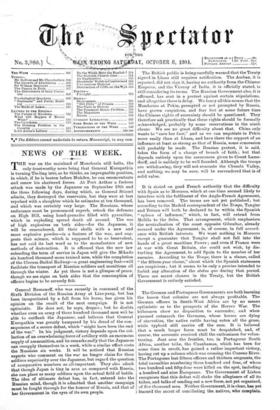The British public is being carefully warned that the Treaty
signed in Lhasa still requires ratification. The Amban, it is reported, did not sign it, having no authority from the Chinese Emperor, and the Viceroy of India, it is officially stated, is still considering its terms. The Russian Government also, it is affirmed, has sent in a protest against certain stipulations, and altogether there is delay. We fancy all this means that the Mandarins at Pekin, prompted or not prompted by Russia, have grown suspicious, and fear lest at some future time the Chinese rights of suzerainty should be questioned. They therefore ask practically that these rights should be formally acknowledged, probably by some reservations in the ninth clause. We see no great difficulty about that. China only wants to "save her face," and as we can negotiate in Pekin more easily than at Lhasa, and have there the support of an influence at least as strong as that of Russia, some concession will probably be made. The Russian protest, it is said, takes the form of a charge of breach of faith ; but that depends entirely upon the assurances given to Count Lams- dorff, and is unlikely to be well founded. Although the troops are withdrawing, they will not evacuate the Chumbi Valley, and nothing, we may be sure, will be surrendered that is of solid value.










































